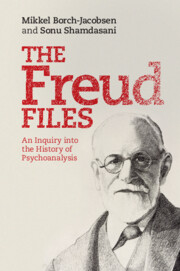Introduction
the past of an illusion
Published online by Cambridge University Press: 05 June 2012
Summary
The history of the World, I said already, was the Biography of Great Men.
Carlyle (1959 [1841]), 251Vienna, 1916. Freud decided to canonise himself. In front of the audience which had come to hear the eighteenth of his Introductory Lectures on Psychoanalysis, given at the University of Vienna, the founder of psychoanalysis undertook to indicate his place in the history of humanity.
Sigmund Freud: But in thus emphasizing the unconscious in mental life we have conjured up the most evil spirits of criticism against psycho-analysis. Do not be surprised at this, and do not suppose that the resistance to us rests only on the understandable difficulty of the unconscious or the relative inaccessibility of the experiences which provide evidence of it. Its source, I think, lies deeper. In the course of centuries the naive self-love of men has had to submit to two major blows at the hands of science. The first was when they learnt that our earth was not the center of the universe but only a tiny fragment of a cosmic system of scarcely imaginable vastness. This is associated in our minds with the name of Copernicus, though something similar had already been asserted by Alexandrian science. The second blow fell when biological research destroyed man’s supposedly privileged place in creation and proved his descent from the animal kingdom and his ineradicable animal nature. This revaluation has been accomplished in our days by Darwin, Wallace and their predecessors, though not without the most violent contemporary opposition. But human megalomania will have suffered its third and most wounding blow from the psychological research of the present time which seeks to prove to the ego that it is not even master in its own house, but must be content itself with scanty information of what is going on unconsciously in its mind. We psycho-analysts were not the first and not the only ones to utter this call to introspection; but it seems to be our fate to give it its most forcible expression and to support it with empirical material which affects every individual. Hence arises the general revolt against our science, the disregard of all considerations of academic civility and the releasing of the opposition from every restraint of impartial logic.
Copernicus, Darwin, Freud: this genealogy of the de-centred man of modernity is by now so familiar to us that we no longer note its profoundly arbitrary character. This is not because one should necessarily be offended by the evident immodesty of the historical tableau presented by Freud. After all, Kant was not especially humble when he spoke of effecting a ‘Copernican revolution’ in philosophy, and Darwin did not hesitate to predict that his theory would provoke a ‘considerable revolution’ in natural history. As Bernard I. Cohen and Roy Porter have shown, the motif of the ‘revolutions’ effected by Copernicus, Galileo and Newton is a commonplace in the history of science since Fontenelle and the encyclopédistes, and Freud was certainly not the first, nor will he be the last, to recycle it to his advantage. However, he was by no means the only figure in psychology to do this, which immediately relativises his version of the evolution of the sciences. At the end of the nineteenth century, there was a veritable plethora of candidates vying for the title of the Darwin, Galileo or Newton of psychology. But how did Freud’s audience, and indeed so many others, come to believe in Freud’s entitlement, rather than that of one of his rivals?
- Type
- Chapter
- Information
- The Freud FilesAn Inquiry into the History of Psychoanalysis, pp. 1 - 29Publisher: Cambridge University PressPrint publication year: 2011



